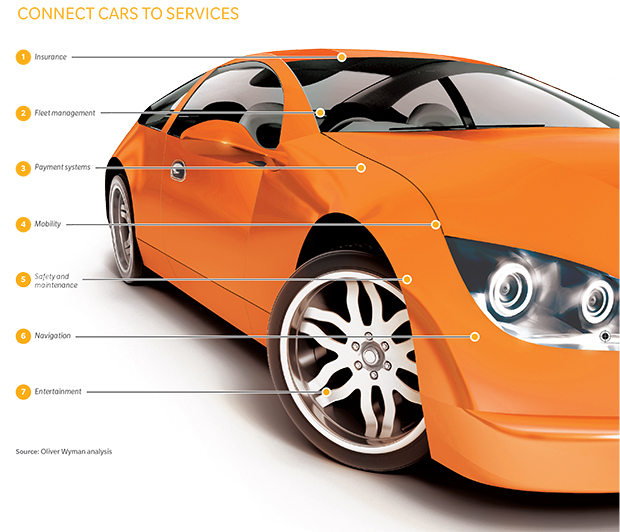The global economy is stalling. But a transformation under way in the auto industry to "connected cars" is creating a golden opportunity for auto makers – and many other service providers – to boost their earnings by billions of dollars. Already, millions of European customers are willing to pay about $130 per year for Internet music streaming. We estimate that Internetsavvy premium car drivers may soon spend five times this amount once subscription business models are introduced that offer bundles of connected services in seven areas.

Driven largely by the mandatory installation of the eCall system in all new vehicles sold in the European Union from 2015, demand for emergency and security services will boom. Remote diagnosis and aftersales services such as maintenance reminders or automatic notification to a repair shop if key parts start to wear down will also become increasingly popular.
Fleet management systems, already in use, will penetrate the mass market and standard platforms. They will become the norm in smaller fleets. The volume of these systems is projected to grow at 20 percent per year to reach 5.7 million units by 2016.
Mobile payment systems are still at a nascent stage but are gaining momentum. In the insurance industry, for example, new region-specific possibilities for product development are taking shape, as well as for customer and accident management.
Operating connected car services will also give rise to new payment models. Today, many services are offered to end-users free of charge in an attempt to gain valuable user data. For example, waze, a provider of free social global positioning system and navigation services, has launched advertising platforms and promotes B2B activities. Google and eBay also are combining free location-based search services with advertising, shopping, and commerce services.
In the years to come, premium auto makers’ primary goal should be to transition from systems integrators to service integrators. Audi, BMW, Mercedes, and Volkswagen need to concentrate on their own strengths in the service segment, by focusing on vehicle-related services such as safety and aftersales services.
It makes little sense, however, for premium auto makers themselves to provide weather and navigation data or music streaming. To offer these services, they must find new partners, or expand existing alliances. For this reason, Daimler and Deutsche Telekom recently announced their future collaboration in online services and web applications. Their joint offering includes real-time traffic information, mobility services, personal radio, and access to social networks. Mass auto manufacturers will need to partner with systems integrators to create comprehensive service bundles. For example, Renault and Atos, the French information technology service provider, have entered into a strategic partnership to sell connected car services. In this venture, Renault uses Atos’s it infrastructure, which integrates a large variety of content providers and also offers an app store and a payment function. The deal allows Renault to pay Atos on a transaction basis.
Add it all up, and it’s clear the auto industry has entered a period of historic flux — and opportunity. Watch for the auto makers that concentrate on their core competencies, target a specific position with the right services, and thus, offer an attractive and comprehensive bundle of services, to emerge as the industry’s next generation of leaders.

















